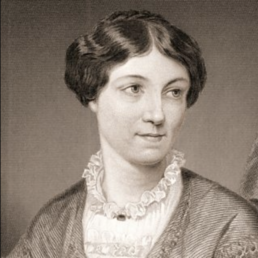These life stories may contain descriptions of childhood trauma and abuse, as well as images, voices and names of people now deceased. If you need help, you can find contact details for some relevant support services on our support page.
Early sociologist and writer, Harriet Martineau (1802-1876), was in foster and kinship care as a child.
Harriet Martineau was born in Norwich, England. The sixth of eight children to Unitarian parents, Elizabeth and Thomas, Harriet writes in her autobiography that, according to her mother, Harriet was “all but starved to death” by the hired wet nurse. Therefore, at three months the infant was sent to recover with a Mrs Merton in a Methodist household. By the time she left some years later, Harriet later recalled, she was an “absurdist little preacher.”
When she was nine, Harriet was sent to stay in the country for six months or so with a cousin of her father—again for the sake of her health. This visited started out as an unhappy one as the resident governess punished the child on her first day for being “obstinate and a liar”. But Harriet later recalled happy times time, such as the “chestnuts bursting from their sheaths, and lying shining amongst the autumn leaves.”
Harriet Martineau became aware of her deafness around the age of twelve. She was to write much later that deaf children were not adequately catered for and she thought it was an advantage that she had progressed well in her education up until the onset of her disability.
At sixteen, Harriet was again sent away because of her health, this time to stay with relatives in Bristol.
So many causes of unhappiness had arisen, and my temper was so thoroughly ajar, that nothing else would have done any effectual good. Every thing was a misery to me, and was therefore done with bad grace; and hence had sprung up a habit of domestic criticism which ought never to have been allowed… (Martineau p. 88).
Harriet’s aunt Kentish had started a boarding school when her husband’s business failed. Helping to run the school were Harriet’s two cousins and Harriet was invited to stay.
My notion was of a stay of a few weeks; and I was rather taken aback when my mother spoke of my absence as likely to last a year or more (Martineau p. 94).
In 1829, Harriet Martineau took on the task of financially providing for her family when their textile business failed, an event she saw as positive. She sold her needlework, and she began selling articles to the Monthly Repository, a Unitarian magazine.
Illustrations of Political Economy established Harriet Martineau financially and as a writer. This was a series of twenty-four stories published between 1832 and 1834, at a rate of one every month with 10,000 copies of each sold and many more read. Because of a gap in the production of social realism with the death of Walter Scott in 1832 and Charles Dickens’ The Pickwick Papers still four years away, it seems there was a gap in the social realism market which Martineau amply filled.
Martineau was criticised for violating gender norms: she wrote about political economy and she wrote about sex and called for ‘the poor’ to restrain themselves sexually. Harriet Martineau spent two years in America during from 1834 and became disillusioned by what she saw as “the political non-existence” of women. She subsequently criticised the way women were educated in Society in America (1837).
Inspired by her time observing in America, Martineau published How to Observe Morals and Manners (1838). Taking a philosophical perspective, she posited that there was a need to get an overview of a whole society, specifically by asking questions such as: how do societal institutions treat their women, how do they treat people with disabilities, how do they punish their criminals or manage their criminals?
Both Society in America and How to Observe are considered as significant early contributions to the new field of sociology, and in 1853 Martineau translated the work of August Comte—founder of sociology—a translation Comte recommended to his students. A sustained interest of Martineau’s was women and their work. She wanted women to be able to legally keep their wages rather than hand them over to their husbands, and she crusaded for good working conditions for needlewomen.
Harriet Martineau was often ill for two sustained periods between 1839 and 1844, and between 1855 and 1876. Despite this, she is regarded as one of the most prolific writers of the 19th century. References:
Arbuckle, Elisabeth. “A Nineteenth-Century Woman’s Engaging with her Times: Harriet Martineau (1802-1876)”. The Martineau Society, 2019. https://martineausociety.co.uk/publications/harriet-martineau-a-new-biography/
“In Our Time. Harriet Martineau”. BBC Sounds, 8 December, 2016. https://www.bbc.co.uk/sounds/play/b084d7b0
Martineau, Harriet. Autobiography (edited by Linda Peterson). Peterborough, Ontario: Broadview Press, 2007.
Roberts, Caroline. The Woman and the Hour: Harriet Martineau and Victorian Ideologies. University of Toronto Press, 2002.
Image available here.
